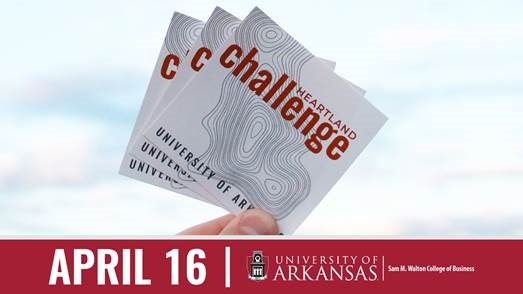A dozen teams from at least eight different universities will compete in the 2021 Heartland Challenge graduate student startup competition next month.
Teams from universities from New York to California, and as far away as Singapore, will participate in the competition being held in an online format because of continuing safety concerns around the worldwide pandemic.
Eleven semifinal teams are already slotted to compete April 15-16. The winner of the scalable ventures track from the Arkansas Governor’s Cup competition on April 1-2 automatically qualifies for the 12th spot in the Heartland Challenge.
The competition is hosted again this year by the Sam M. Walton College of Business at the U of A with generous support from the Walton Family Foundation. The inaugural Heartland Challenge was held in spring 2020.
“The Walton College is proud and excited to again host this outstanding international competition for graduate student startup teams,” said Matt Waller, Walton College dean and the Sam Walton Leadership Chair. “And we thank the Walton Family Foundation for its continued generous support of these student competitors.”
The competition, which is designed to simulate the process of raising venture capital for a high-growth enterprise, will be held across three rounds, including an audience-choice elevator pitch and a 15-minute investment pitch, for a cash prize pool of $95,000. Teams will be questioned and receive feedback from a network of judges, including angel investors, serial entrepreneurs and industry executives.
Aurign, a music publishing startup from Georgia State University, won the 2020 competition, securing $50,000 for their idea of using blockchain technology to securely file music-publishing documents.
The U of A Office of Entrepreneurship and Innovation will oversee the competition, with support from the Arkansas Capital Corporation.
The 11 semifinalist teams already scheduled to compete are:
- Backup, a two-sided marketplace that connects Airbnb hosts with a reliable, affordable workforce of cleaners whose services align with the specific requirements of high-turnover rental properties. Backup says it will be the Uber of vacation rental cleaning in seven years. Backup is representing the U of A.
- BioSeal XE, a wound bioadhesive that stops bleeding and accelerates wound healing for emergency situations involving cuts, tears or punctures. The initial market is horse owners who live on remote ranches to treat horses suffering traumatic wounds. BioSeal XE says it supplies immediate blood clotting, accelerated wound healing, infection prevention, easy application, cost savings and increased reliability. BioSeal XE is representing Oklahoma State University.
- BullyProof, a software analytics platform that helps companies protect their workplace culture. BullyProof includes M.B.A. and M.F.A. graduate students who are representing the U of A.
- Cerobex Drug Delivery Technologies, which plans to commercialize a novel lipid-nanoparticle based drug delivery system that has demonstrated the ability to transport many different types of therapeutic molecules across the blood-brain barrier and into the brain tissue. Cerobex plans to develop treatments for select rare neurological diseases and to license treatments and the delivery system to pharmaceutical companies. Cerobex is representing Tufts University.
- Closed Composites, which recycles carbon fiber composite waste into reusable organic materials and pristine carbon fiber mats using a proprietary chemical reaction. Closed Composites allows the recovery of more value from waste composites than other leading recycling strategies. Closed Composites is representing the University of Southern California.
- Nurlabs, a patent-pending, non-traditional, non-invasive liquid biopsy platform using materials science and machine learning for early cancer screening, bringing a fresh perspective to an old problem. Nurlabs is representing the University of California at Los Angeles.
- Paldara Inc., a patent-pending antimicrobial hydrogel to prevent 99% of catheter-associated urinary tract infections, the number one healthcare acquired infection. Prevention beats remediation economically and from a quality-of-life perspective. Paldara is representing Oklahoma State University.
- ReGen Technologies, which has a pilot product SynFloTM, a vascular graft based on a patent-pending technology that significantly reduces vascular surgery-associated risk and health care costs. The technology has also shown promise as a potential solution to other frustrations related with infections, suggesting the proprietary technology could yield a broader surgical product platform. ReGen Technologies includes biomedical researchers from the University of Arkansas for Medical Sciences and business students from the U of A.
- Ripely provides a 100% or more increase in the shelf life of fresh food. Ripely produces edible, tasteless, odorless and invisible protein-based protective coatings for fresh food that are easily applied by food retailers and consumers, at no expense to food quality. Ripely says its mission is to provide the largest innovation in fighting food waste since the advent of refrigeration. Ripely is representing Rensselaer Polytechnic Institute.
- Uniphage Inc., which uses machine learning to mainstream bacteriophage solution usage by making the process of producing bacteriophage solutions significantly “less random,” faster, cheaper and more robust. Uniphage also uses the same core set of bacteriophages with minor genetic modifications for every new disease to make the regulatory approval process much easier. Uniphage is representing Yale-NUS College.
- Urogix, which has a minimally invasive surgical device for age-related prostate enlargement that offers an alternative to years-long medications or more invasive surgical procedures by providing immediate and permanent relief without complications. Urogix is representing Washington University in St. Louis.
About the University of Arkansas: As Arkansas' flagship institution, the U of A provides an internationally competitive education in more than 200 academic programs. Founded in 1871, the U of A contributes more than $2.2 billion to Arkansas’ economy through the teaching of new knowledge and skills, entrepreneurship and job development, discovery through research and creative activity while also providing training for professional disciplines. The Carnegie Foundation classifies the U of A among the top 3% of U.S. colleges and universities with the highest level of research activity. U.S. News & World Report ranks the U of A among the top public universities in the nation. See how the U of A works to build a better world at Arkansas Research News.
Topics
Contacts
David Speer, senior director of communications
Sam M. Walton College of Business
479-575-2539,
dlspeer@uark.edu
